商务英语2(英语本科选择修课程)
体验商务英语综合教程2 -- Unit 1 Careers
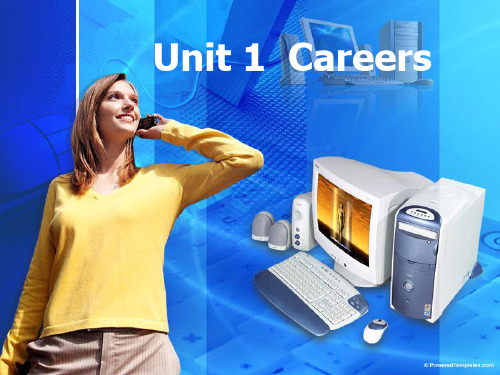
Patty Stonesifer President and Chairman Gates Library Foundation Redmond, Washington
I left a great job as head of interactive media at Microsoft for one reason: the passion was gone. My pocketbook, ego, and sense of excitement were being satisfied, but I no longer had passion for the challenges I faced each day. Lots of people thought I was crazy to walk away from it all. But I felt like a juggler -- managing projects, budgets, and people. Eventually I found my dream job. It aligns my personal expertise and goals with an opportunity to put technology in the hands of people who otherwise would not have access to it. No matter how high your career registers on the conventional charts, you've got to listen to your heart
6. Ambitious people often ________ on a career plan while they are still
商务英语翻译(英译汉)第二版电子教案第12单元

所谓语序,是指各级语言单位在组合中的 排列次序。
语序包括词序和句序。下面就词序和句序 谈谈英汉两种语言的差异。
英汉两种语言在词序上的差异
1.主语和谓语之间的差异:一般情况;倒装句和疑 问句
2.宾语的词序差异:英语中,宾语可以位于句首, 句中,句末。汉语中,宾语出现在及物动词后。
When there is a particular average loss, other interests in the voyage, such as the carrier and other cargo owners whose goods were not damaged, do not contribute to the partial recovery of the one who suffered the loss.
The end! 谢谢观赏!
原译:国际对等贸易,作为一种销售条件,是指供应方以 合同方式,承诺对某些特别的、给购买方以补偿和利益的 商务提案予以回报和承办的一种做法。
改译:国际对等贸易,是指供货方以签订供货合同作为销 售条件,承诺对某些指定的对买方有利可图的商业项目予 以承接和互抵的习惯做法。
三.拆分翻译法
因原文句子过长,且含有多层意思,无法按照原文句子结 构的顺序进行翻译,译者就可以将原句的结构拆开,在不 损害原意的情况下按照汉语的表达习惯重新组合,以时间 先后,因果关系,假设与结果等逻辑关系相继翻译成一句 到两句意思连贯,内容完整的句子。
变序翻译法是指对原文句式进行重组。
International countertrade is a practice whereby a supplier commits contractually - as a condition of sale – to reciprocate and undertake certain specified commercial initiatives that compensate and benefit the buyer.
体验商务英语综合教程2 教案
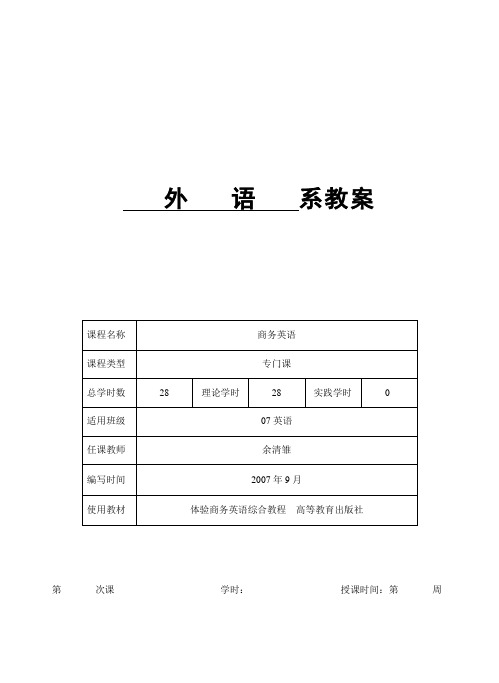
外语系教案第次课学时:授课时间:第周Context: Unit 1Title: IntroductionsThe tone of a business relationship can be set by an initial introduction. It is important to make a good impression right from the first handshake. When meeting businesspeople for the first time, is it better to be formal or informal? If in doubt, advise students to adopt a more formal approach. Here are some points to remember when making business introductions in English-speaking Western countries:a.Introduce businesspeople in order of professional rank –the person of highestauthority is introduced to others in the group in descending order, depending on their professional position.b.When possible, stand up when introductions are being made.c.If clients are present, they should be introduced first.d.The same and title of the person being introduced is followed by the name and titleof the other person.PROCEDURESLesson 1Starting upSs listen to four businesspeople and match the speakers to their business cards. Vocabulary 1: Job titlesSs list word as job titles or departments. Then Ss talk about their jobs or studies. Vocabulary 2: NationalitiesSs match countries and nationalities.Reading: Describing peopleThis reading section can be completed in two parts. Ss can start preparatory work on the article about Phil Knight, the founder and CEO of Nike, and complete Exercise A. Lesson 2Reading: Describing peopleSs complete more detailed comprehension questions about Phil Knight (Exercise B and C). Language focus 1: to beSs are introduced to positive and negative forms of the verb to be.Language focus 2: a/an with jobs; wh- questionsSs look at the use of a/an before vowels and consonants and are introduced to what, who and where question words.Lesson 3Listening: Talking about yourselfSs listen to three people talking about their jobs.Skills: Introducing yourself and othersSs listen to three conversations where people introduce themselves and others. They then practice introductions.Lesson 4Case study: Aloha in HawaiiSs find out information about people at a conference.WritingSs write an e-mail about two people from the conference.第次课学时:授课时间:第周Context: Unit 2Title:Work and leisureIt has never been easy to balance work and leisure. During the late twentieth century the concept of a job for life was largely replaced by the short-term contracts favored by the enterprise culture. Some found themselves with too much free time n their hands when company restructures led to redundancies. Others saw leisure time shrink and working hours increase in exchange for greater financial rewards. The British TUC estimates that, despite European Union legislation, 4 million people in the UK work more than 48 hours per week and 1 in 25 work over 60 hours. It is thought that managers and professional staff work the longest hours.PROCEDURESLesson 1Starting upSs listen to four people talking about what they want from work and make word partnerships.Vocabulary 1: Days, months, datesSs practice days, months and dates and use the prepositions in, at and on with time phrases.Lesson 2Reading: Describing your routineSs read an article about the working day of Michael Dell, Chairman of Dell computers. Language focus 1: Present simpleSs look at the present simple to talk about habits and work routines.Vocabulary 2: Leisure activitiesSs use leisure activities, verbs and time phrases to talk about leisure time.Lesson 3Language focus 2: Adverbs and expressions of frequencySs complete exercises using adverbs and expressions of frequency and listen to three people talking about their typical day.Skills: Talking about work and leisureSs match questions and answers about work and leisure and then listen to a conversation about what Tim does at the weekend. Afterwards they talk about their own work and leisure activities.Lesson 4Case study: Independent Film CompanySs role play an interview between Human Resources and unhappy employees of a film company.WritingSs use the information from the case study to list the working conditions they want to change.第次课学时:授课时间:第周Context: Unit 3Title:ProblemsProblems are a fact of life. So problem-solving is an essential life skill both at home and in the office. Many pressurized managers in the modern business world may benefit from training in conflict resolution to resolve disagreements. It is wise to deal with sensitive matters face-to-face. Irate e-mails and memos often contain sentiments we would modify if speaking to the person directly. Social psychologist Albert Merabian says that words account for seven percent of communication, tone 38 percent and body language 55 percent. These elements are particularly useful in understanding and resolving potential conflict situation but can be lost in cyber communication. PROCEDURESLesson 1Starting upSs match sentences and problems and listen to five phone calls to identify the product and the problem.Vocabulary: AdjectivesSs look at the adjectives and their opposites and use too and enough.Lesson 2Reading: Dealing with problems at workFour people answer the question: ‘What are the biggest problems facing your company?’Language focus 1: Present simple: negatives and questionsSs match questions and answers, make negative sentences and practice the question forms in a role play.Lesson 3Language focus 2: have gotSs look at the use of have got, haven’t got and Have you got? To talk about possession. Skills: Telephoning: solving problemsSs listen to four phone calls where people talk about problems. Then they role play a phone conversation talking about problems with a product.Lesson 4Case study: Blue HorizonGuests of a holiday company compare their holiday apartments with the holiday brochure and complain to a representative of the company.WritingSs listen to a voice mail and write a telephone message for the manager of Blue Horizon. 第次课学时:授课时间:第周Context: Unit 4Title:TravelAround 1400 BC Polynesians paddled across the open ocean in canoes, serching for new trading partners, and the age of business travel began. The modern businessperson is more likely to choose flying as the quickest way of getting from A to B. Although safer than canoe, this can still pose hazards. Frequent fliers are likely to encounter a number of hurdles that can lead to increased stress levels. First, you have to acturally get on the plane. Most airlines overbook to minimise seat wastage and no-shows. This means that if all the passengers who actually booked seats turn up, there could be a shortage of place. If there are not enough volunteers to give up their seats, then you may find yourself bumped – denied boarding and put on a later flight.PROCEDURESLesson 1Starting upSs talk about things they like and don't like when travelling on business. Vocabulary: Travel detailsSs practise the alphabet and numbers 1-100 and match verbs and travel phrases. Listening: Listening for informationSs listen and answer questions about travel information.Lesson 2Language focus 1: can/ can’tSs put a dialogue into the correct order and then listen to check. Then Ss role play a conversation using can/ can’t.Reading: Business hotelsSs read about facilities in The Tower Hotel.Lesson 3Language focus 2: there is/ there areSs complete sentences using ther is/ there are and carry out a role play about a new job abroad.Skills: Making bookings and checking arrangmentsSs listen and answer questions about booking a hotel room before role playing a similar situation.Lesson 4Case study: Pacific HotelA hotel manager and assistant manager allocate rooms to twelve guests at a small hotel. WritingSs write a fax to one of the guests confirming arrangements.第次课学时:授课时间:第周Context: Unit 5Title:Food and entertainmentFood can communicate complex messages about status, nationally and identity. The fashion for eating out in restaurant was adopted by the upper classes during the French revolution. Most English words relating to eating out are adopted from the French (hotel, café, menu, chef, etc.) including restaurant, which was originally from the French verb meaning ‘to store’. Later, the migrations of the twentieth century proved fertile ground for mingling cuisines and a knowledge of the vast variety on offer is viewed as a mark of modern cosmopolitan taste.PROCEDURESLesson 1Starting upSs talk about the kind of food they like and match dishes and countries. Vocabulary: Eating outSs look at food groups and different parts of a menu.Reading: TippingThis reading section can be completed in two parts. Ss match jobs with places where people work. Then Ss talk about what services they tip before completing a table about which countries tip most often (Exercises A-C).Lesson 2Reading: TippingSs read an article about factors that encourage people to tip and answer comprehension questions (Exercises D-E).Language focus 1: some/anySs correct mistakes using some and any and underline the correct words in a dialogue. Listening: Ordering a mealSs listen to what a man and a woman order in a restaurant.Lesson 3Language focus 2: Countable and uncountable nounsSs identify countable nouns and complete exercises using a lot of, many or much. Skills: EntertainingSs look at language for entertaining visitors in a restaurant and listen and respond to a waiter’s questions.Lesson 4Case study: Which restaurant?Three colleagues decide which restaurants to choose to entertain three important customers.WritingSs write an e-mail inviting a customer to dinner and giving details about the restaurant. 第次课学时:授课时间:第周Context: Unit 6Title:SalesThings have come a long way since the days when peddlers went from door to door selling wares from a pack. Now advertisements pop up as text messages. Goods can be ordered by mall order. We can compare prices, get quotes, check if an item is in stock and place an order without moving away from our computer screen. In some ways the methods o buying and selling have undergone a revolution and in others little has changed since the early 1900s when keywords in sales were service and relationships. A modern sales force uses a mixture of tried and tested techniques and new technology to increase sales. The foundation of modern sales techniques was developed in the 1950s and includes gaining the client’s interest, building desire by showing product features or giving samples, increasing conviction by comparing the product with competitors or using statistics to highlight benefits and, finally, closing the deal.PROCEDURESLesson 1Starting upSs listen to three people talk about where and when they buy products. Vocabulary 1: Buying and sellingSs complete a sales leaflet for a computer company and listen to a conversation between a buyer and seller.Lesson 2Reading: Thirsty for success?Ss read a job advertisement for a sales representative in a soft drinks company. Language focus 1: Past simpleSs complete a sales report using the past simple.Vocabulary 2: Buying and sellingSs complete a leaflet for a car hire company.Lesson 3Listening: SellingKevin Warren, the Vice President, Sales and Marketing, of Coca-Cola Enterprises, gives some advice to salespeople.Language focus 2: Past time referencesSs are introduced to expressions that refer to the past, such as ago, last (week), for, on, from… to, in and during.Skills: Presenting a productSs listen to a salesperson presenting a product at a trade fair. Then they role play being the buyer and seller at a trade fair.Lesson 4Case study: Link-up LtdA company sells mobile phones and service packages. Ss role play being salespeople and customers.WritingSs write an e-mail to a colleague about what phone and service package a customer wants, using information from the case study.第次课学时:授课时间:第周Context: Unit 7Title:PeopleWhat charactreristics can help people to succeed in business and in life? A positive attitude, intelligence, perserverance and self discipline all help. Are the personality traits that contribute to success or failiure genetic? Or do we learn these characeristics are we grow up? Experts still disagree as to whether nature or nurture is more important.Can personality and intelligence be measured? IQ and psychometric tests remain popular, and the latter are still used by many companies as part of the selection process. However, in recent years the idea that only one type of intelligence exists has been criticised. Howard Gardner developed the theory of multiple intelligence. This said that people have a number of different types of intelligence that they possess to varying degrees. These are linguistic, musical, logical-mathematical, spatical, body-kinesthetic, intrapersonal(e.g. insight) and interpersonal (e.g. social skills and the ability to understand and motivate other people).PROCEDURESLesson 1Starting upSs answer a questionnaire about what sort of person they are.Vocabulary: Describing peopleSs look at the adjectives to describe people’s personalities.Listening: A difficult colleagueA property developer talks about a colleague who left the company.Lesson 2Language focus 1: Past simple: negatives and questionsSs focus on past simple negatives and questions and write questions using Why, How long, What, When and Where.Reading: Stella McCartneySs read an article about the fashion designer Stella McCartney. Ss then match verbs and nouns to make word partnerships.Lesson 3Language focus 2: Questions formsSs look at yes/no questions and open questions. They complete a questionnaire and then listen to check answers.Skills: Negotiating: dealing with problemsSs listen to a conversation about problems of understafing in a company. Then they role paly a conversation negotiating a new company car.Lesson 4Case study: A people problemA US food coompany has problems with a business manager.WritingSs write a memo aobut their meeting.第次课学时:授课时间:第周Context: Unit 8Title:MarketsIf a company wants to sell a product or service successfully, it ust identify the target market. There are many different types of market to choose from. The mass market aims to sell to as many people as possible, crossing age and income groups. In contrast, a niche market focuses on a narrowly defined group fo customers. It often caters to a need that has been overlooked by those suppliers who cater to markets which deal in more mainstream products or sevices. Focussing on niche markets can be cost effective as marketing campaigns can sim budgets directly at potential customers, for example through advertising on local radil or in magazines targeting special interst gorups. PROCEDURESLesson 1Starting upSs ask and answer questions about a populatioin pie chart.Vocabulary: Types of marketSs listen and repeat large numbers and look at adjectives to describe markets.Lesson 2Reading: The car market in ChinaSs answer quesitons and search for large numbers in an article aobut the Chiese car market.Language focus 1: Comparatives and superlativesSs practice comparative and superlative forms of adjectives..Lesson 3Listening: Doing business in RussiaSs listen to three parts of a presentation about doing business in Russia.Language focus 2: much/ a lot, a little/ a bitSs use the language to compare cars and pool talbes and use a bar chart to talk about sales in Russia and Poland.Skills: Telephoning: solving problemsSs listen to three marketing executives talking about a new snack bar and then role play taking part in a marketing meeting.Lesson 4Case study: Cara CosmeticsA body care company is launching a new shampoo. Ss siscuss the name , size and price of the product, main outlet and income group of the target market.WritingSs write a short description of the new shampoo for Cara Cosmetics catalogue.第次课学时:授课时间:第周Context: Unit 9Title:CompaniesA company is an organisation that produces goods or services to make a profit. There ar e many different types.A small business might become a medium or large business. If a company sells directly to the public, it is a retil business. A wholesale business sells goods in bulk to other companies. Some companies have Ltd in their name. This stands for limited company. Here, shareholders only lose what they invested if the company goes bankrupt. A company with PLC after its name is a Public limited company – its shares can be freely bought and sold. In contrast a Private limited company only passes shares to another person if other shareholders agree. A conglomerate consists of several companies that have joined together. A multinational or transnational company has global operations in many different countries.PROCEDURESLesson 1Starting upSs do a companies quiz and then talk about famous companies from their country. Listening: The Mini rangeSs listen to the Corporate Communications Managers for the Mini range of cars at BMW. Language focus 1: Present continuousSs look at the present continuous for temporary ations and things that are happening now.Lesson 2Vocabulary: Describing companiesSs complete exercises to describe two companies and then complete a company profile. Reading: LVMHSs read about LVMH, the luxury goods manufacturer.Lesson 3Language focus 2: Present simple or present continuousThe tenses are compared and contrasted. Ss then do exercises to find the correct tense before carrying out a role play showing someone around a company.Skills: Starting a presentationSs listen to the start of a presentation and use notes to introduce their own presentation.Lesson 4Case study: You and your companySs role play introducing themselves and their company at a training course on giving presentations.WritingSs write a short profile about their company from the information in the case study.第次课学时:授课时间:第周Context: Unit 10Title:The WebNow that the Internet has arrived, it is difficult to imagine how we lived without it; it is has revolutionised communications. Changes are taking place at an incredible speed. Hardware is becoming more compact, faster and more affordable, allowing more individuals and companies to utilise the Net. In the past, research took longer, important documents got lost in the post and information could be difficult to find. Unfortunately this revolution has brought with it a new set of problems. Research is certainly quicker but connections can be slow, making it difficult to access the websites that you need. Documents can still get lost, but now they float around cyberspace. Spam can be a problem when you e-mail account becomes overloaded with advertising that you don't want. But more sinister are the various computer viruses which can make your computer crash. And not all countries have equal access to the advantages of new technology. PROCEDURESLesson 1Starting upSs listen to people talking about what they use the Internet for and then talk about their own Internet use.Vocabulary: Internet termsSs read advice about using the Internet and match Internet terms with their definitions.Listening: Website designA website designer talks about his job.Lesson 2Language focus 1: Talking about future plansSs look at the use of the present continuous for future use and going to for future plans. Reading: E-commerceSs look at an article about making money form the internet.Vocabulary 2: Time ecpressionsSs complete future time expressions such as by net year, in two week s’ time, tomorrow evening, in the near future.Lesson 3Language focus 2: willSs use will to complete exercises about future events and predictions. Then they role play a meeting to talk about the launch of a new website.Skills: Making arrangemensSs listen to four people making and changing arrangements by phone and role play similar situations.Lesson 4Case study: Isis Books plcThe marketing director and two sales representatives of an Internet business book company plan a sales trip to Poland and Russia.WritingSs write an e-mail to customers to confirm the date and time of the appointment arranged in the case study..第次课学时:授课时间:第周Context: Unit 11Title:CulturesCompanies which deal in the global marketplace need to be able to adapt to different business cultures. It is easier to make a good impression in our own culture than in another, where our knowledge of the language and rules of behavior may be limited. Knowledge of the protocol and etiquette in the countries we do business with is essential. Protocol is adhering to the correct procedures and conduct in formal situations. This involves knowing the acceptable way to behave and includes formalities of rank, which denotes the level of a person’s position in an organisation. Etiquette focusses on communicating in a respectful and polite way in accordance with the good manners and accepted norms of the culture.PROCEDURESLesson 1Starting upSs look at tips for visiting another country or doing business there.Vocabulary: Company culturesSs complete sentences about different company cultures.Listening: Cultural mistakesSs listen to three people talk about cultural mistakes they have made.Lesson 2Language focus 1: should/ shouldn'tSs use should and shouldn't to give advice and make suggestions.Reading: Fast food in JapanAn American sandwich chain has problems with their Japanese franchise. Ss are introduced to phrasal verbs.Lesson 3Language focus 2: could/ wouldSs look at could and would to make requests and offers.Skills: Identifying problems and agreeing actionSs listen to a human resources manager talking to the general manager of a company about problems with an employee. The Ss role play a similar problem.Lesson 4Case study: A change of cultureA general manager of an overseas bank encounters problems from the staff when she wants to introduce new ideas.WritingSs write action minutes for the meeting they had in the case study.第次课学时:授课时间:第周Context: Unit 12Title:JobsThere are valuable skills that make job seekers attractive to employers:Technical skills – which include the specialist knowledge that will help them do the job. Personal skills –personality, attitude, personal work habits and style. (Can they work under pressure? Can they work as a part of a team as well as unsupervised?). Transferable skills – the basic skills learnt through everyday situations or previous work experience that can be usefully applied to a new position.PROCEDURESLesson 1Starting upSs discuss which jobs should get the highest salary and what aspects they would like or not like in a job.Vocabulary: Skills and abilitiesSs use verbs to complete a job advertisement.Language focus 1: Present perfectSs look at the use of the present perfect to talk about actions that continue from the past to the present.Lesson 2Reading : A curriculum vitaeSs put headings in the correct place and answer questions about a curriculum vitae.Lesson 3Language focus 2: Past simple and present perfectThe tense are compared and contrasted. Ss complete a text using the correct form of the verb and look at time expressions that go with each tense.Skills: Interview skillsSs look at interview tips, listen to an interview and role play an interview situation.Lesson 4Case study: High Profile Inc.The marketing director and the human resources director of a sports agency interview candidates for a job.WritingSs write a letter to the successful candidate from the case study interview.第次课学时:授课时间:第周Book IIContext: Unit 1Title:CareersReports of the death of the traditional career have been greatly exaggerated. Despite the growth of outsourcing (buying in services that were previously performed by a company’s employees from outside the organisation) and teleworking by freelancers working from home communicating via the Internet, most professional people still go to what is recognisably a job in a building that is recognisably an office. The average tenure, the length of time that people spend in a particular job, has remained unchanged (at about seven years) for two decades.PROCEDURESLesson 1Starting upSs talk about their level of ambition and say what makes for a successful career. Vocabulary: Career movesSs look at typical word combinations and verbs used with career.Listening : Human resources and recruitmentSs listen to a public relations professional who advises companies on human resources and recuitment.Lesson 2Reading: Female train driversSs read an article about the recruitment of female underground train drivers in London.Language review: Modals 1Ss look at modals used for ability, requests and offers (can, could and would) and do exercises based around a job interview.Lesson 3Skills: Telephoning: making contactSs listen to some calls and learn how to get through to who they want to speak to, leave messages, etc.Lesson 4Case study: Blue HorizonSs choose the right candidate for an internal promotion within an international training company.第次课学时:授课时间:第周Context: Unit 2Title:Selling onlineThe world of e-commerce moves fast. The dotcom frenzy of the late 1990s, with companies raising vast amounts of money from investors, for example just to sell dog food over the Internet, came and went, and some organisations removed the dotcom suffix from their names, so much did it become a synonym for failure. E-commerce courses in business schools are no longer oversubsribed and no longer preaching that ‘everything has changed’. Companies look more at how e-commerce can be used in conjunction with other methods of selling: in retailing this means clicks and mortar, combining traditional retail outlets with online operations, ratther than investing in a whole new expensive infrastructure.PROCEDURESLesson 1Starting upSs talk about traditional shopping versus buying online and goods typically bought online Vocabulary: Shopping onlineSs work on words related to buying and selling.Listening: Selling onlineSs listen to the founder of the British operation of Amazon talk about how to succeed in online selling.Lesson 2Reading: Virtual pocket moneyTeenagers buy a lot online. The article looks at payment methods they can use to do this. Language review: Modals 2Ss apply modals for obligation, necessity and prohibition (must, need to, have to and should) in the context of rules for an online book club and in an interview.Lesson 3Skills: Negotiation: reaching agreementSs discuss tips for successful negotiating, listen to a negotiation and then role play one themselves.Lesson 4Case study: Blue HorizonA traditional package holiday company wants to team up with an online business. Ss role play negotiations between the two companies.第次课学时:授课时间:第周Context: Unit 3Title:CompaniesMultinationals are the most visible of companies. Their local subsidiaries give them sometimes global reach, even if their corporate culture, the way they do things, depends largely on their country of origin. But the tissue of most national economies is made up of much smaller organisations. Many countries owe much of their prosperity to SMEs (small and medium-sized enterprise) with tens or hundreds of employees, rather than the tens of thousands employed by large corporations. Small businesses with just a few employees are also important. Many governments hope that the small businesses of today will become the multinationals of tomorrow, but many owners of small companies chose to work that way because they find it more congenial and do not want to expand. PROCEDURESLesson 1Starting upSs talk about the types of company they would most like to work for and the business sector they work in now.Vocabulary: Company vocabularySs look at vocabulary used to describe companies and that used in company reports to describe performance.Listening: Reasons for successSs listen to the sales manager of a UK motocycle manufacturer talk about the factors that make his company successful.Lesson 2。
英语本科专业人才培养方案

英语(商务方向)本科专业人才培养方案一、专业名称、代码及门类专业名称:英语专业代码:所属门类:文学(二级类:外国语言文学类)二、培养目标本专业培养具有为社会发展与地方经济建设服务的基本意识,具有强烈的社会责任感和良好的公民道德修养,具备商务英语方面的专业知识与应用能力,掌握英语听、说、读、写、译等基本技能,从事国际商务、翻译、涉外文秘、涉外旅游、涉外管理、英语教案等工作,德、智、体、美全面发展的应用型实用人才。
三、培养规格及要求. 热爱中国共产党,热爱社会主义祖国,富有较强的自信心、进取心、事业心与责任感,具有良好的团队精神和创新创业精神,具有良好的个人品德与社会公德,在身心素质方面具有健康的体魄和良好的心理素质;.具备扎实的英语语言基础,比较熟练地掌握英语听、说、读、写、译的基本技能;.掌握中国及英语国家政治、经济、历史和文化的相关基础知识,具有一定的跨文化交际能力;.掌握本专业相关的实用商务基础知识并了解其发展趋势,如国际贸易、外贸函电、单证、国际商务谈判、国际商法、国际市场营销、电子商务等,具备独立从事英语商务活动的基本能力;.初步掌握第二外国语(日语),具备基本的听、说、读、写、译能力;. 掌握计算机基础知识,能进行基本的运用和操作;.具有一定的自学能力和创新意识,掌握文献检索、资料查询及运用现代信息技术获得相关信息的基本方法,具备初步的科研能力;.实行双证书制:学生除了获得本专业毕业证外,根据自己的职业选择,至少获得一种与专业相关的其他证书:商务英语证书、报关员证、翻译证、导游证、单证操作员、秘书证或教师。
. 具有健康的体魄和一定的军事基本理论及基本技能,达到国家规定的大学生体育合格标准和军事训练标准;四、主干学科与主要课程主干学科:英语语言文学主要课程:高级英语、二外(日语)、语言测试、英语语言学概论、英美文学选读、英语国家简况、笔译(英汉、汉英)、口译(英汉、汉英)、论文写作五、主要实践性教案环节实践教案环节:军事训练、入学及毕业教育、社会实践、专业技能综合实训、毕业实习、毕业论文(设计)六、学制、学分及学位学制:四年学分:本专业毕业不低于学分学位:文学学士七、课程设置、结构及学分分配表集中实践环境按每周学时计算。
外语系英语专业国际传播方向本科培养方案(最新)
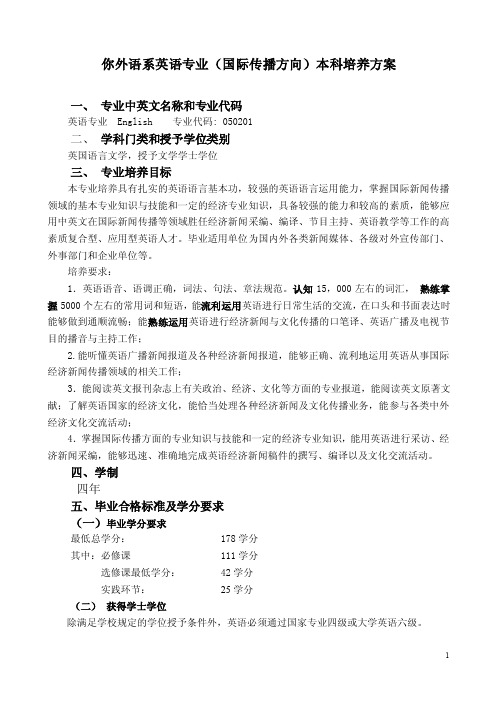
你外语系英语专业(国际传播方向)本科培养方案一、专业中英文名称和专业代码英语专业 English 专业代码: 050201二、学科门类和授予学位类别英国语言文学,授予文学学士学位三、专业培养目标本专业培养具有扎实的英语语言基本功,较强的英语语言运用能力,掌握国际新闻传播领域的基本专业知识与技能和一定的经济专业知识,具备较强的能力和较高的素质,能够应用中英文在国际新闻传播等领域胜任经济新闻采编、编译、节目主持、英语教学等工作的高素质复合型、应用型英语人才。
毕业适用单位为国内外各类新闻媒体、各级对外宣传部门、外事部门和企业单位等。
培养要求:1.英语语音、语调正确,词法、句法、章法规范。
认知15,000左右的词汇,熟练掌握5000个左右的常用词和短语,能流利运用英语进行日常生活的交流,在口头和书面表达时能够做到通顺流畅;能熟练运用英语进行经济新闻与文化传播的口笔译、英语广播及电视节目的播音与主持工作;2.能听懂英语广播新闻报道及各种经济新闻报道,能够正确、流利地运用英语从事国际经济新闻传播领域的相关工作;3.能阅读英文报刊杂志上有关政治、经济、文化等方面的专业报道,能阅读英文原著文献;了解英语国家的经济文化,能恰当处理各种经济新闻及文化传播业务,能参与各类中外经济文化交流活动;4.掌握国际传播方面的专业知识与技能和一定的经济专业知识,能用英语进行采访、经济新闻采编,能够迅速、准确地完成英语经济新闻稿件的撰写、编译以及文化交流活动。
四、学制四年五、毕业合格标准及学分要求(一)毕业学分要求最低总学分:178学分其中:必修课111学分选修课最低学分:42学分实践环节:25学分(二)获得学士学位除满足学校规定的学位授予条件外,英语必须通过国家专业四级或大学英语六级。
六、教学计划进程表英语专业(国际传播方向)课程设置及教学进程表(2007)七、课程结构分析表表一英语(国际传播方向)专业毕业生应修学分参考表表二课程结构分析表表三英语专业(国际传播方向)课程结构表八、学生选课指导外语系英语专业学生经过前两年四个学期基础学习后,从第三年的第五学期开始,外语系提供两个方向供选择:国际商务和国际传播。
商务英语专业的大学课程有哪些?

商务英语专业的大学课程有哪些?有的专业设置一般有三种情况1、专业为主,英语为辅:课程设置以专业课程为主,只在高年级阶段开设旨在帮助学生提高书面专业阅读能力的“经贸文章选读”课程或类似与专业有关的英语阅读课程。
这些课程一般课时量很不注重学生的口头能力的培养;2、英语为主,专业为辅:以英语为主的大多数是语言类的专业,开设的涉及商务英语专业的课程也不学生的知识面单一,虽然英语技能很好,但专业基础欠缺;3、专业和英语同时兼顾,采取这种设置的大多数都是财经类专业,尤其是国际贸易、国际金融、旅游、国际合作与交流等专业。
我们这里所要研究的是第三种情况。
目前此类专业可大致分为两拥有专业发展方向(如:国际贸易、国际金融、国际商法、国际合作与交流等)的英语专业学生称为国际商务英语专业;北京对外经济贸易大学、广东外语外贸大学、上海对外贸易大学、东北财学、西南财经大学、湖南大学等有代表性的院校都设有国际商务英语学院、系、专业,综合以上各所开设的课程与经济全球化人才需求特点,国际商务英语课程的开设应分为三个层次:1、基础英语课程,包括大学基础英语听、说、读、写、译、英美文化、语言文学知识等课程;2、国际商务英语核心课程,包括商务英语听说、商务英语阅读、商务英语写作、商务英语翻译、国际文化交流等课程;3、国际商务英语专业课程,根据学科的发展特点可以开设国际贸易、国际金融、国际商法、国际关国际旅游、国际新闻、国际投资与合作、国际市场营销等课程。
ManagementLeadershipMarketingAccountingInternational business and tradeSales and Customer ServiceHospitality and tourism课程介绍:专科思想道德修养与法律基础,毛泽东思想、邓小平理论和“三个代表”重要思想概论,大学语文,综合英语(一),综合英语(二),英语国家概况,英语语法,英语阅读(一),英语阅读(二),英语写作基础,听力,口语,商务英语阅读 ,商务英语写作 ,商务英语听说 ,法学概论,宪法学。
专业名称英语专业(国际商务英语方向)(本科) 专业代码2

专业名称:英语专业(国际商务英语方向)(本科) 专业代码:291
序号课程代码
课 程 名 称
学分课程类别考试方式
可顶替本专业的其他专业计划课程课程名称
专业代码及名称
11180中国近现代史纲要2必考笔试中国近现代史纲要597英语(本)
2
1181马克思主义基本原理概论
4必考
笔试马克思主义基本原理概论
3
0039第二外语(德语)6任选一门
笔试第二外语(德语)0055
第二外语(法语)6笔试第二外语(法语)
0837日语(一)7笔试日语(一)0838俄语(一)
7笔试
俄语(一)
1196
第二外国语(韩语)6笔试第二外国语(韩语)40073高级英语12必考笔试高级英语5
0294
外贸英语写作
8必考笔试外贸英语写作
585国际贸易(本)
60685外刊经贸知识选读6必考笔试外刊经贸知识选读73272商务英语翻译6必考笔试英语翻译597英语(本)
83273国际市场营销学(英文)
4必考笔试英语写作93274国际商务(英文)4必考笔试英美文学选读100559英语听力(本)3必考笔试英语听力(本)11
4576英语口译3必考实践英语口译12
1099国际商务英语6任选一门笔试国际商务英语0109国际金融6笔试国际金融
587金融(本)
0105管理学原理6笔试管理学原理0799电子商务概论4笔试电子商务概论577信息管理与服务(本)
4741电子商务概论实践2实践电子商务概论实践13
4156
英语(国际商务英语)毕业论文
通过实践
英语毕业论文
597英语(本)。
新视野商务英语综合教程2
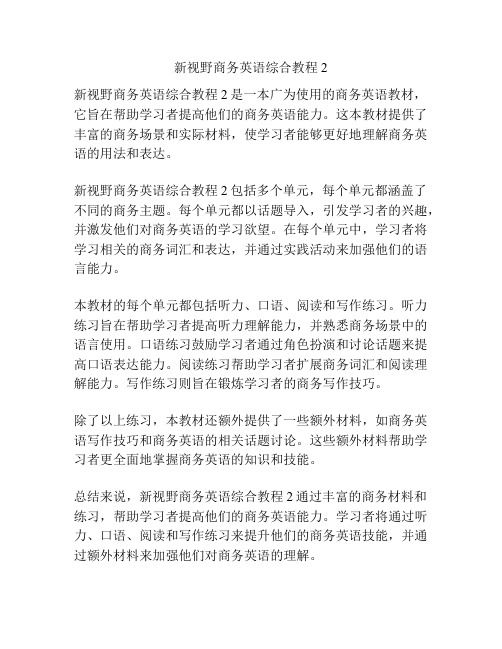
新视野商务英语综合教程2
新视野商务英语综合教程2是一本广为使用的商务英语教材,它旨在帮助学习者提高他们的商务英语能力。
这本教材提供了丰富的商务场景和实际材料,使学习者能够更好地理解商务英语的用法和表达。
新视野商务英语综合教程2包括多个单元,每个单元都涵盖了不同的商务主题。
每个单元都以话题导入,引发学习者的兴趣,并激发他们对商务英语的学习欲望。
在每个单元中,学习者将学习相关的商务词汇和表达,并通过实践活动来加强他们的语言能力。
本教材的每个单元都包括听力、口语、阅读和写作练习。
听力练习旨在帮助学习者提高听力理解能力,并熟悉商务场景中的语言使用。
口语练习鼓励学习者通过角色扮演和讨论话题来提高口语表达能力。
阅读练习帮助学习者扩展商务词汇和阅读理解能力。
写作练习则旨在锻炼学习者的商务写作技巧。
除了以上练习,本教材还额外提供了一些额外材料,如商务英语写作技巧和商务英语的相关话题讨论。
这些额外材料帮助学习者更全面地掌握商务英语的知识和技能。
总结来说,新视野商务英语综合教程2通过丰富的商务材料和练习,帮助学习者提高他们的商务英语能力。
学习者将通过听力、口语、阅读和写作练习来提升他们的商务英语技能,并通过额外材料来加强他们对商务英语的理解。
国开(中央电大)专科《商务英语2》形考任务(单元自测1至8)试题及答案国开中央电大专科人文英语1
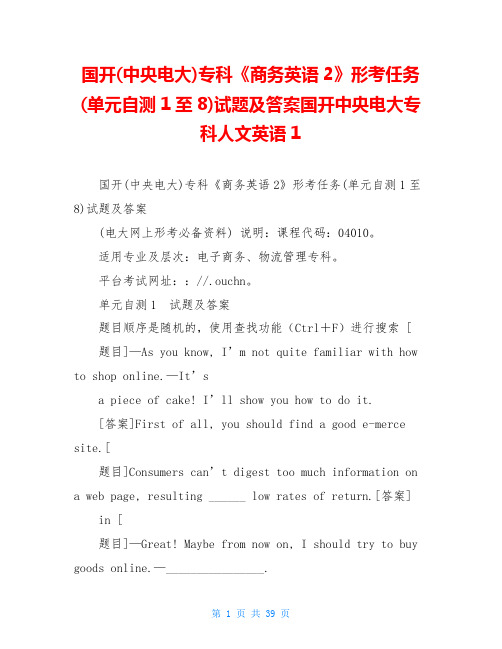
国开(中央电大)专科《商务英语2》形考任务(单元自测1至8)试题及答案国开中央电大专科人文英语1国开(中央电大)专科《商务英语2》形考任务(单元自测1至8)试题及答案(电大网上形考必备资料) 说明:课程代码:04010。
适用专业及层次:电子商务、物流管理专科。
平台考试网址:://.ouchn。
单元自测1 试题及答案题目顺序是随机的,使用查找功能(Ctrl+F)进行搜索 [ 题目]—As you know, I’m not quite familiar with how to shop online.—It’sa piece of cake! I’ll show you how to do it.[答案]First of all, you should find a good e-merce site.[题目]Consumers can’t digest too much information on a web page, resulting ______ low rates of return.[答案]in [题目]—Great! Maybe from now on, I should try to buy goods online.—________________.[答案] Why not? Go ahead.Justgive it a try. [题目]I know personal selling is also a very effective tool for building ______buyers’ confidence.[答案] up [题目]—I think we can use two or more kinds of media together in an advertising caign.—________________.[答案]That’s quite right.Wecan attract more people.[题目]In China, Taobao is one of _______ e-merce sites.[答案]the most popular [题目]In my opinion, the first thing _______ is what tools we should use.(考点:不定式结构的用法) [答案] to be discussed [题目]It can be aimed _______ individuals with select surfing behavior.[答案]at [题目]—Morning, Daniel.TodayI’d like to discuss the promotional events of our products with you.—________________.[答案] Ok.Ithink we should draw up a thorough plan, first.[题目]—Uh, I think online shopping is very time-consuming.—________________.[答案]I somewhat agree with you, but not pletely.二、翻译:从以下A、B、C三个选项中选出与英文最适合的中文翻译。
2020—2021学年第二学期大学英语选课说明及拓展课程介绍

2020—2021学年第二学期大学英语选课说明及拓展课程介绍一、大学英语课程学分说明大学英语课程按照分类、分级、分模块的架构设计,要求学生在第一学年和第二学年完成至少12学分的学习任务,学生可以通过下述方式获得学分:1.入学时学习A类课程的同学可通过下列任意一种方式获得英语课学分:[1]4学分(学完上册)+ 4学分(学完下册)+ 2学分(通过四级考试)+ 2学分(一门拓展课)= 共12学分[2]4学分(学完上册)+ 4学分(学完下册)+ 2学分(一门拓展课)+ 2学分(一门拓展课)= 共12学分[3]4学分(学完上册)+ 4学分(学完下册)+ 2学分(通过四级考试)+2学分(通过六级考试)= 共12学分2.入学时学习B类课程的同学可通过下列任意一种方式获得英语课学分:[1]4学分(学完二册)+ 4学分(学完三册)+ 2学分(通过四级考试)+ 2学分(一门拓展课)= 共12学分[2]4学分(学完二册)+ 4学分(学完三册)+ 2学分(一门拓展课)+ 2学分(一门拓展课)= 共12学分[3]4学分(学完上册)+ 4学分(学完下册)+ 2学分(通过四级考试)+2学分(通过六级考试)= 共12学分3.入学时学习C类课程的同学可通过下列任意一种方式获得英语课学分:[1]4学分(学完二册)+ 4学分(学完三册)+ 2学分(通过四级考试)+ 2学分(一门拓展课)= 共12学分[2]4学分(学完二册)+ 4学分(学完三册)+ 2学分(一门拓展课)+ 2学分(一门拓展课)= 共12学分[3]4学分(学完上册)+ 4学分(学完下册)+ 2学分(通过四级考试)+2学分(通过六级考试)= 共12学分二、2019级选课重要提示1.2019级同学均须按照下列要求选修一门大学英语-拓展(限选课)课程:(1)目前学习大学英语A2、大学英语B2的同学须选修大学英语-拓展AB 的课程(限选一门)(2)目前学习大学英语C2的同学须选修大学英语-拓展C的课程(限选一门)。
商务英语(中国普通高等学校本科专业)

通识教育课程分为公共基础课程和校级通识教育课程两类。
公共基础课程一般包括思想政治理论、信息技术、体育与健康、军事理论与训练、创新创业教育、第二外语 等课程。
校级通识教育课程一般包括提升学生知识素养、道德品质与身心素质的人文社会科学和自然科学课程。
2007年3月,中华人民共和国教育部正式批准开设商务英语本科专业,对外经济贸易大学成为首家获批准开 设商务英语本科专业的高校。
2008年5月9—11日,由高等教育出版社组织召开的全国第四届体验商务英语论坛上,来自150所高校的200余 位代表对商务英语本科专业的建设表达了关切。
2012年,商务英语正式列入《普通高等学校本科专业目录》。
代表院校:广东外语外贸大学
这种方式在课程体系的层面解决两者之间的复合。商务学科与英语学科充分交叉糅合,在课程设置层面体现 复合型人才培养的要求课程体系既重视商务学科知识和英语知识与技能的系统和深入学习,也重视把两者有机融 合,在教学计划和教学过程中体现复合型英语人才的培养。课程分为四个模块:商务学科基础理论和知识、商务 话语、商务实践和人文通识。
商务英语旨在培养具有扎实的英语基本功、宽阔的国际视野、专门的国际商务知识与技能,掌握经济学、管 理学和法学等相关学科的基本知识和理论,具备较强的跨文化交际能力与较高的人文素养,能在国际环境中熟练 使用英语从事商务、经贸、管理、金融等工作的复合型、应用型商务英语专业人才。
发展历程
中国的商务英语教学与科研,与中华人民共和国的对外贸易和对外开放事业发展同步发展,一直是作为培养 复合型英语人才的高等教育活动来开展的。商务英语从一开始就具有基于内容的英语教学的特征,以商务内容的 材料作为教学材料,注重培养使用语言处理这些材料的能力。
商务英语专业本科培养方案

目录商务英语专业本科培养方案 (1)日语专业人才培养方案 (26)西班牙语专业本科培养方案 (46)汉语言文学专业本科培养方案 (68)汉语言文学专业本科培养方案 (95)商务英语专业本科培养方案(专业代码:050262)一、专业介绍简介:商务英语专业(Business English Program)属于英语类专业,课程体系以英语与商务知识和能力课程的有机交叉融合为核心,具有跨学科特点。
本专业坚持“英语+商务+人文素养+创新创业”的办学特色,培养既有扎实的英语知识与语言应用能力,又有基本的经济管理、国际商务专业知识与能力,同时具有国际视野和跨文化沟通交流能力的复合型应用型商务英语专门人才。
主干课程主要包括英语听、说、读、写、译等英语知识与技能类的课程,经济学基础、管理学、国际贸易商科基本知识与能力类课程,以及人文素养、科技文化、跨文化交流类的综合课程。
毕业生的就业领域主要是在涉外部门与企业从事商务谈判、翻译、涉外文秘和商务管理与服务等工作,也可以在教育、研究、管理等部门或企业从事与英语语言相关的工作,同时也可以选择留学、考研、自主创业或到国外就业。
随着中国经济发展进一步加快,中国和世界的联系也会更加密切,在一个较长的时期内,商务英语专业人才具备良好的就业前景。
办学定位:根据学校的办学定位,本专业的办学定位是立足江苏省和长三角区域社会经济发展,面向石油化工及相关行业,培养具有英语语言知识和语言应用能力、具备国际商务活动的基本知识和能力、适应跨国经济贸易需求的复合型、应用型英语人才。
二、培养要求1.培养目标商务英语专业旨在培养具有良好的人文与科学素养和国际视野,英语语言基本功扎实,掌握英语语言、经济学基础、国际贸易等学科的基础理论与知识,具备商务英语应用能力、跨文化交际能力、商务实践能力、思辨与创新能力,能从事国际商务(如翻译、贸易或商务专员、行政文秘等)、英语教学与研究等工作的复合应用型英语人才。
- 1、下载文档前请自行甄别文档内容的完整性,平台不提供额外的编辑、内容补充、找答案等附加服务。
- 2、"仅部分预览"的文档,不可在线预览部分如存在完整性等问题,可反馈申请退款(可完整预览的文档不适用该条件!)。
- 3、如文档侵犯您的权益,请联系客服反馈,我们会尽快为您处理(人工客服工作时间:9:00-18:30)。
绝密★启用前2010年7月湖北省高等教育自学考试商务英语 模拟试卷二(课程代码 09988)本试卷共 而,满分100分;考试时间150分钟。
I. (10×1’)Questions 1 ~ 10Read the two columns below. Match each phrase or statement in the left column with a proper one in the right. For each question (1 ~ 10) write one letter (A ~ J) in the following box.II. (5×2’)Questions 11 ~ 15Read questions 11 ~ 15. For each question, write one letter (A, B or C) corresponding to your answer in the following box .B.I will file it.B.Ms Kientsch has to cancel the meeting because she wants to make a call.A.Purchasing departmentB.Dispatch departmentC.A.B.1-year warranty for free maintenance.B.It will be a busy Thursday.C.Mr. Wilson will meet Mr. Gunnar Larsen at 8 p.m, Wednesday.III. (10×1’)Questions 16 ~ 25Read the office plan below. For each question, choose the correct answer from the plan, write down your answers in the corresponding blank.16. Which department plans to sell new products? ____________ 17. Which department recruits new employees? ____________ 18. Which department pays the staff? _____________ 19. Which department develops new products? _____________ 20. Which department checks the quality? ____________ 21. Which department arranges routine office work? ____________ 22. Which department takes care of the machines? _____________ 23. Which department organizes product conference and international meeting? ___________ 24. Which department is responsible for after-sales care? ____________ 25. Which department buys goods for the company? ___________IV . (5×2’) Questions 26 ~ 30Read the text and answer questions 26~35.A.the SmithsonianB. at the Kennedy CenterC. Capitol Hill27.Where should you go for an unusual meat?A.McDonald’sB. the CorcoranC. Meskerem28.Where can you buy interesting presents?A.museum shopsB. the Washington MonumentC. Meskerem29.You want to see a play. Where should you go?A.Fasika’sB. Arena StageC. Dupont Circlet30.What should you wear when you go out to dinner?A.Formal clothesB. Jeans and T-shirtC. Work clothesQuestions 31 ~ 36Read the following advertisement, and decide whether thefollowing statements (31-36) are true or false.In Our Business, the most important thing is Your Bottom Line.You’re reading a magazine with hundreds of “look-alike” ads for IBM CompatibleComputers, they all claim similar performance, outstanding quality, low price and great support.How do you make your choice?Price: Some show unusable entry level or giant overkill units, and sock-it-to –you on thedrives, monitors and video cards you really need. Some add outrageous freight, handling and customization charges. We don’t. We advertise the industry’s largest selection of complete drive and video configurations all unbelievably priced. All priced delivered to your door.Quality: Some claim quality but offer only a 30, 60 or 90 day warranty. Our 5 year program is the best and longest in the business …… PC Magazine, PC Buyers Guide, Computer Shopper, Byte, and Personal Computing all say the same thing about PC Brand:” Outstanding quality… Rock Bottom Price.” We couldn’t have said it better ourselves.Support: Everybody claims it, but check our facts; 30 Day Money Back Guarantee (no RMA’s required), Toll Free Technical Support, Toll Free Customer Service, On-site Service, On-site Installation, Leasing and Customized “Built to your Specs” Configurations. Even our FAX’s are on Toll Free Lines. Our support is so good it wins us Awards.Put it all together and it spells our commitment to you, the Bottom Line, the Best one in the PC BRAND OFFERS A FULL RANGE OF COMPUTER SYSTEMSNAME BRAND PERIPHERALS AT THE LOWEST PRICESFREE FREIGHT TOLL-FREE SERVICE & SUPPORT 5-YEAR WARRANTY * 30-DAYMONEY BACK GUARANTEEON-SITE SERVICE 24-36 MONTH LEASING( ) 31. Service and support is included in the price.( ) 32. PC Brand offers the longest warranty in the business. ( ) 33. PC Brand has won many awards because of its low price.() 34. PC Brand advertises a larger selection of computer drive and video configurations than any others in the business.( ) 35. PC Brand often says about itself: outstanding quality… Rock Bottom Price. ( ) 36. PV Brand offers the longest money-back guarantee.VI. (11×1’) Questions 37 ~ 47Read the following sentences. For each sentence (37~47) write one suitable word to fill the gap.37. I am ________ in your cycling equipment. 38. We have a wide ________ of mountain bikes. 39. This one is __________ in two colours.40. We can offer a __________ of 10% on large sales. 41. Is the Sales Manager _________ the fairs.42. Dispatch _________ the company ’s products to the customers.43. When we checked the machine, we noticed some __________ to the case. 44. We will __________ the money if the goods are not satisfactory. 45. How many days ’ __________ do you get a year.46. Cathay Pacific has __________ a lot of money in the new airport.47. There ’s a __________ on orders - it will take at least another ten days to dispatch the goods.VII. (6×2’) Questions 48 ~ 53Read the following article and then give each paragraph a suitable title from the box.How to lead a better life________(48). Get regular fresh air. Sunshine is cheering, rain refreshing. Best of all, fresh air gets you out of the office. Most offices are unhealthy.________(49). Get out of your car and onto the public transport. You will reduce noise, get fitter and have more time to read and look.________(50). Don ’t travel long distance to work. Find a job near home. Move out of the city.________(51). Go home from work earlier. Long hours don ’t make you more efficient. If there ’s too much work for you to do, say no.________(52). Learn to enjoy yourself. Relax, play sport and music, take up a hobby. Please yourself more-make/find time to do it.________(53). Exercise regularly. Eat sensibly, don ’t smoke or drink alcohol, and cut down on caffeine drinks. Try water or herbal teas.VIII. (10’)Your boss, Jennifer lee is going to Kuala Lumpur on business. You have to arrange accommodation for her. She wants a single room with shower from 23 to 26 Sep . Write a fax to Rasa Cinta to book a room for her. Write altogether 20~25 words.________________________________________________________________________________________________________________________________________________________________________________________________________________________________________________________________________________________________________________________________________________________________________________________________________________________________________________________________________________________________________________________________________________________________________________________________________________________________________________________________________________________________________________________________________________________________________________________________________________________________________________________________________________________________________________________________________________________________________________________________IX. (15’) You are Mr. Rogers. Use these notes to write a letter in reply to Pacific Machines. Write about 80 words.________________________________________________________________________________________________________________________________________________________________________________________________________________________________________________________________________________________________________________________________________________________________________________________________________________________________________________________________________________________________________________________________________________________________________________________________________________________________________________________________________________________________________________________________________________________________________________________________________________________________________________________________________________________________________________________________________________________________________________________________________________________________________________________________________________________________________________________________________________________________________________________________________________________________________________。
